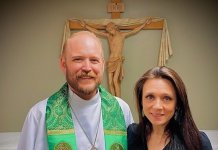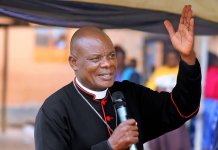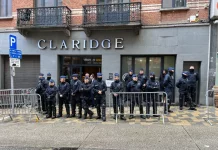GRASSROOTS Anglicans are calling on the Evangelical Bishops of the Church of England to reject their liberal colleagues’ proposals to bless Same Sex unions when the House of Bishops meets tomorrow (Jan 30).
They also want them to state publicly that should the proposals still pass – after debate at next month’s General Synod – they will not allow the Prayers of Love and Faith to be used in their dioceses and, will continue to require all clergy to declare their agreement to the Church’s biblical and historic teaching on marriage and sexuality. Such an act would start to create a network of ‘orthodox’ dioceses within the CofE, with the potential to be a more structural grouping.
Revisionist (liberal) bishops propose that blessing same sex unions as a ‘steppingstone’ towards the CofE eventually offering gay weddings. They also want to bin Issues in Human Sexuality which contains the historic, universal biblical teaching that marriage is between one man and one woman for life.
The Archbishop of York has told journalists he expects Issues to be replaced by the House of Bishops with new ‘Pastoral Guidance’ in “the next few months”, which would permit gay clergy in partnerships to have sex – changing biblical teaching of millennia. Such a move would separate the CofE from potentially dozens of orthodox Provinces across the Anglican Communion. The role of the Archbishop of Canterbury as the spiritual leader of the Anglican Communion would also be in jeopardy, according to the Global South Fellowship of Anglican Churches (GSFA) chairman, the Most Revd Justin Badi.
On February 8, the General Synod will discuss the bishops’ controversial Response to the six-year Living in Love and Faith ‘listening process’ on marriage and sexuality. Frustrated grassroots Anglicans – who have formed a new movement called Anglican Orthodox – believe in the past six years, despite a legal duty “to teach and to uphold sound and wholesome doctrine, and to banish and drive away all erroneous and strange options (Canon C18.1),”Evangelical Bishops have remained publicly silent, awaiting the outcome of LLF talks. Into this vacuum of genuine leadership, Anglican Orthodox believes the nation has been “increasingly confused on the issues of identity and gender – without a clear biblical framework”.
Revisionist bishops such as the Bishops of Oxford, Worcester and Buckingham, and the former Bishop of Liverpool, have ‘stepped up to the microphone’ and joined gay activists in trying to persuade churchgoers to accept gay marriage. Anglican Orthodox agrees with James Marriott, that: The power of intolerant minorities [is] the Achilles heel of tolerant societies. A strident minority can impose their preferences on everyone else because, for moderate majorities, accommodating them makes life easier” [‘The Week’ 3-10DEC).
Anglican Orthodox is made up of parish clergy and laity who are opposed to the bishops’ proposals. They are forming a network of support at parish level should gay blessings come into being. They’re also joined by retired bishops and clergy. Their views are shared by hundreds of clergy across social media who are totally against the proposals, and the bishops ‘giving in’ to popular culture when, they say, the Church is called by God to be ‘counter-cultural’. They are forming a forward-thinking, strategic group, after being deeply concerned that evangelical groups have consistently been ‘on the back foot’, reacting to the Revisionists’ latest strategic move forward. They want a new, confident and courageous movement which will develop partnerships between Evangelicals, Anglo Catholics and other Anglicans who hold traditional biblical views, and will offer a team of media spokespeople with a co-ordinated message.
Revd Paul Eddy, Convenor of Anglican Orthodox, and an Oxfordshire vicar said: “On Friday, the Church of England Evangelical Council issued a statement saying they were ‘grieved and dismayed by the [bishops] Response’ – and are ‘believing them to be contrary to the doctrine and teaching of the Church of England.’ We very much welcome this as far as it goes. It is commendable CEEC asks its members to write to their bishop and General Synod members, and will, in the future, ‘produce Guidance’ about how parishes might respond should the proposals come in. But, bishops and General Synod members need to know what these responses would look like now – ahead of tomorrow’s House of Bishops meeting – and ahead of the February 8 debate. Parishes need to start to think through these issues in detail now – and send informed letters to bishops, and synod members.”
Anglican Orthodox is therefore calling on the Evangelical Bishops to act decisively tomorrow. But, it says IF the revisionists succeed, orthodox parishes will need to plan, and agree to show ‘visible differentiation’ from liberal bishops, clergy and parishes by:-
● seeking Alternative Episcopal Oversight (including confirmations/ordinations)
● not attending, and encouraging orthodox congregations not to attend services/events in cathedrals/churches which offer same sex union prayers of blessing
● only paying enough Parish Share (called ‘Ministry Costs+’), to cover agreed direct parish clergy costs, and a small contribution to vital central costs (i.e. Registry, Safeguarding, clergy housing)
● the balance of Parish Share (probably around 25%), to be donated to a Good Stewards Trust Fund, or similar, from which orthodox parishes can ask for grants towards mission needs
● refusing to subsidise (via Parish Share or other means), deanery parishes who support the bishops’ proposals
● refusing to pay Parish Share during interregnums until the Induction/licensing of the next orthodox incumbent
● ensuring the orthodox parish has full representation on Deanery Synods under the Church Representation Rules so that the Electoral College for General Synod laity has the maximum number of voters
● ensuring other parishes in the Deanery have only the correct number of orthodox Deanery Synod members under the Church Representation Rules (to reduce their voting numbers)
● ensuring orthodox clergy and laity stand for Diocesan Synods, Bishops’ Council and Diocesan Committees and vote for orthodox projects, but do not support the use of diocesan funds for revisionist projects
● where a diocesan bishop is seeking to promote a revisionist agenda in the diocese, using all synodical means to scrutinise proposals, including budgetary scrutiny, and votes of ‘no confidence’
Mr Eddy says ‘IF’ the bishops proceed, Anglican Orthodox member parishes will deploy ‘visible differentiation’ in deaneries and dioceses. This will be felt acutely in those financially struggling. Whilst there are many complex legal issues to overcome, Mr Eddy says there still might be a way forward, if all the Evangelical Bishops publicly said they would not allow these same sex blessing prayers in their dioceses. He explained: “The fudge might still go through, but orthodox clergy/parishes in revisionists dioceses could, in time, seek to transfer episcopal oversight to those publicly-led evangelical dioceses, and with that, their full parish share – which would drastically improve their finances! Yes, it would take lots of hard and careful legal work to do so, but even if Synod voted for gay marriage, it would take years for that legislation to go through the system. If there’s a will, there’s always a way – but it is now up to the Evangelical Bishops.”
The Convenor says Anglican Orthodox will consult with other umbrella groups, but this grassroots movement will seek to lead, and co-ordinate support on the ground – especially when orthodox parish clergy are the focus of attack. He said: “We know the gay lobby can be ruthless in homing in on individuals who stand up for traditional marriage. If these proposals go ahead, and a vicar says he or she will not bless gay unions, we anticipate they will face persistent discrimination and abuse in an attempt to wear them, and the church’s PCC, down. Orthodox clergy in Revisionist dioceses know that in the past six years, they have not been shown practical and/or public support on the ground from bishops on the issues of sexuality and gender, or even much publicly from existing evangelical umbrella groups. Anglican Orthodox will ensure legal, practical and media support for them, and their families.”
Anglican Orthodox also has close links with the GSFA, the oldest orthodox umbrella body for provinces within the Anglican Communion, which will stand with clergy and laity who remain within the CofE as a principled ‘Holy Remnant’. It will work with anyone committed to orthodox Anglicanism, both Evangelicals and Anglo Catholics.
The call by Anglican Orthodox on Evangelical Bishops to act tomorrow has been welcomed by Archbishop Mouneer Anis, Archbishop Emeritus of Egypt, a widely-respected international Anglican Communion leader, and, a former Chairman of, now Honorary Adviser to the GSFA. He said: “When Christians – including bishops – lose a sense of hope and belief that the CofE can grow in a modern, Western culture of wokeness, it is easy to be tempted to compromise on the historic faith as we have received it, our universal doctrine, and the practical out-working of faith in all matters – including marriage and sexuality.
“There’s a feeling that unless the church changes, no one will join it and we’ll be the last bishops and Christians to ‘turn out the lights’. But Biblical Truth is Truth – whatever the culture. When God inspired the Bible to be written, he foresaw the choice Evangelical bishops would have to make in 2023: choose God’s Word or, be conformed to the culture around them. I wholeheartedly support the call from Anglican Orthodox, and shall be praying that the Evangelical bishops do what they know is the right thing: to reject the Revisionist plans, and to trust God to give them the strength of their conviction, knowing they will have the support of the vast majority of the Anglican Communion across the globe.”
Anglican Orthodox is currently developing a website. In addition to inviting individual clergy and laity to join, it is seeking to invite and unite a wide spectrum of CofE groups, including: New Wine, HTB, Renew, Resource, Affinity, Church Society, Diocesan Evangelical Fellowships, the Church of England Evangelical Council, and others.










